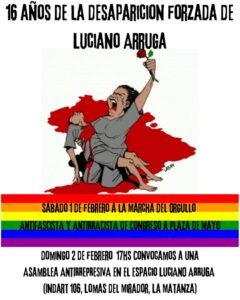
On January 31st, a new anniversary of the forced disappearance of Luciano Arruga, the 16-year-old kidnapped, tortured and murdered by the Buenos Aires Police in Lomas del Mirador, will be celebrated.
On this anniversary, his sister Vanesa Orieta and the group Familiares y Amigxs de Luciano Arruga are calling for a series of activities to make visible the fight against state repression and the violations of human rights that persist in our country.
On January 31st, it will be 16 years since the forced disappearance of Luciano Arruga, the 16-year-old victim of kidnapping, torture and murder at the hands of the Buenos Aires Police in Lomas del Mirador.
On this new anniversary, her sister Vanesa Orieta and the group Familiares y Amigxs de Luciano Arruga are organizing activities to denounce state repression and persistent violations of human rights in Argentina.
One of the activities will take place on Saturday, February 1, and consists of participation in the Antifascist and Antiracist Pride March, which will start from Congress towards Plaza de Mayo. The following day, Sunday, February 2, an Anti-Repressive Assembly will be held at 5 p.m. at the Luciano Arruga Memory Space, located in Lomas del Mirador.
In a context of social crisis and cutbacks in rights, Vanesa Orieta reflects on current policies: “We are not taking a step back when it comes to denouncing the exclusion of millions of people by the administration headed by Javier Milei. The liberal policy that implements the shock doctrine is not new, but the memory of the people continues to be a beacon to warn about serious violations of human rights.”
Since Luciano’s disappearance in 2009, his case has become an emblem of the fight against trigger-happy police and the criminalization of poor youth. Orieta denounces the continuity of repressive logic and the impunity of those responsible: “Daniel Scioli and Fernando Espinoza, governor of the province of Buenos Aires and mayor of La Matanza at the time of Luciano’s disappearance, continue to enjoy total impunity.”
The call also seeks to articulate with other social struggles, such as that of the LGBTIQNB+ collective, which faces an open attack by the current government. “We know that Luciano, as a man, dark-skinned, from a slum and young, was a victim of patriarchy and the uniform racism that exploits the kids in the neighborhoods,” says Orieta, stressing the need to build spaces for collective resistance.
On this anniversary, the call is clear: keep the memory alive, strengthen the organization and demand justice. The activities are part of the slogans “16 years without Luciano, 16 years of impunity”, “The police killed him, the state made him disappear” and “The kids are not dangerous, they are in danger”.
The activities of February 1 and 2 not only honor the memory of Luciano Arruga, but also renew the commitment to fight against a system that continues to exclude, repress and violate the most vulnerable sectors.
The Luciano Arruga case
Luciano Arruga, a 16-year-old from Lomas del Mirador, disappeared on January 31, 2009 after being arrested by the Buenos Aires Police. Coming from a poor neighborhood, Luciano had been harassed by police officers who tried to force him to steal for them in well-off areas. His refusal made him the target of constant threats and persecution.
The night of his disappearance, witnesses saw him being taken to the Lomas del Mirador police station, a place that had already accumulated complaints of torture and mistreatment. For years, the police denied any link to his whereabouts, and the case was marked by cover-ups, irregularities in the investigation and judicial disinterest.
In 2014, after five years of tireless searching by his family and human rights organizations, it was discovered that Luciano had died the same night he disappeared. According to official records, he was run over on General Paz, but instead of notifying his family, his body was buried as NN in the Chacarita Cemetery.
Luciano’s case became an emblem of the fight against trigger-happy police, state repression and police impunity in Argentina. His family, led by his sister Vanesa Orieta, continues to denounce human rights violations and demand justice, while keeping his memory alive as a symbol of resistance against institutional violence.
Te Puede Interesar:
https://www.instagram.com/diarioncomatanza
https://facebook.com/diarionco



